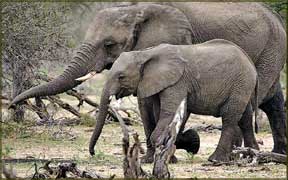Ivory demand could see African elephant wiped out
A soaring demand for ivory in China and the Far East is putting
Africa's elephant population under strain and could see the creatures
wiped out altogether by poachers in some countries, conservationists
have warned.
Trade in ivory was made illegal worldwide in 1989 but the ban was
lifted in 2008 to allow Southern African countries to sell stockpiled
ivory to China and Japan. Campaigners say this has also fuelled the
demand for illegal ivory.
|

Demand for Ivory, a threat to African elephant population |
Organized criminal gangs are blamed for the lion's share of the
trade, often paying impoverished and desperate locals to carry out the
killings and harvest the previous tusks.
The backing from gangs means poachers come heavily armed and the
military or wildlife units employed to stop them are frequently
outgunned.
People from China's large and growing population living in Africa are
now thought to be largely responsible for collecting the bounty and
arranging for it to be shipped to Asia.
There, it is carved into household ornaments, jewellery and
chopsticks by artisans who favour African over Asian ivory. The main
buyers are believed to be newly-wealthy Chinese nationals in prosperous
cities such as Shanghai, Guangzhou and Beijing.
Despite the global ban on the ivory trade, 2011 was the worst year
for more than two decades for large seizures of illegal ivory. Wildlife
groups say poaching rates in Africa are now increasing year on year.
In Cameroon earlier this year, poachers killed as many as 300
elephants over ten weeks while in neighbouring Gabon the previous year,
the country's wildlife unit estimated that around 50 a week were being
killed and the population could be wiped out by the end of the decade.
In Samburu, Northern Kenya, a quarter of its previously stable elephant
population has been lost since 2009, in large part due to illegal
killing.
Iain Douglas Hamilton, the founder of the country's Save the
Elephants charity, told a BBC Panorama investigation into the problem
that they were in the middle of a poaching 'spike'.
“It is worse than it's ever been before,” he said. “If it got out of
hand it would threaten not only elephants but the communities around.”
Cynthia Moss, from Kenya's Amboseli Trust for Elephants, said some other
areas of Africa were even worse off. “At the present rate I don't see it
letting up and I think some countries are going to lose all their
elephants and that is just tragic,” she said.
Meanwhile, African elephants could be extinct within 15 years because
of the illegal ivory trade, conservation experts have warned.
The population - currently 600,000 - is diminishing by 38,000 each
year.
These figures, calculated using the annual number of illegal tusk
seizures, significantly exceed elephant birth rates meaning the species
could face extinction entirely within 15 years, says Samuel Wasser of
the Scientific American Journal.
The worldwide illegal trade in wildlife is valued at tens of billions
of American dollars (£12.5billion) and is believed to have the same
significance now as the blood-diamond trade during the peak of the
African civil wars.
In 2006, 11 metric tonnes of illegal ivory were seized from ships
bound for Taiwan and Japan.
The International Fund for Animal Welfare (IFAW) says immediate
action needs to be taken. The group calls for EU and CITES members
(Convention on International Trade in Endangered Species) to stop
supporting legal ivory sales. Instead, they urge members to back Kenya’s
proposal to extend the current 'resting period' on elephant and ivory
sales from nine to 20 years at the next CITES meeting in March 2010.
“This alarming level of illegal hunting could drive the African
elephant to extinction across much of Africa in just 15 years,” said
Robbie Marsland, director of IFAW UK.
He added: “Most people will be shocked to hear that, 20 years on from
a ban on international ivory trade, elephants in Africa are still
threatened by commercial poaching. The ivory trade must be banned once
again, and comprehensively, if we want to prevent the extinction of
elephants.
“Sadly, the truth is that ivory trade anywhere is a threat to
elephants everywhere.”
Chad’s Zakouma National Park had 3,885 elephants in 2005 but by 2009
the figure had plummeted to just 617. At least 11 rangers were killed by
poachers there over the same period. Meanwhile, older elephants really
are wiser, according to zoologists who found they are better able to
tell which lion roars are particularly dangerous.
Although it is commonly assumed that lionesses do most of the
hunting, when it comes to larger prey the stronger males tend to be more
active and effective. - The Daily Telegraph |



